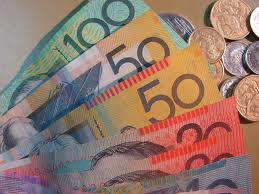1. Wampum - Iroquois used to trade in beads. These beads not only meant money, but they meant status based on how they were woven and to whom they were given. Wampum, while only used by this particular bunch of American Aboriginals, had the distinction of being mentioned a lot in cartoons and movies in the 50's to the 70's. Now it's not really proper to use that slang term. When I was a kid, I heard wampum used a lot.
2. Credit - This is not money. I know I should be talking about money, but this is closely related. This is future money. This is the COST of money. Credit means get what you want now and pay us later, quite a bit more. I had a friend that said, there are two kinds of people. People that make interest and people that pay interest. Credit costs you money, but is used interchangeably as currency. It's like nuclear power, if you can use it wisely, it's really pretty convenient. If you can't, it's extremely costly.
3. Pound Sterling - The sun never sets on the British empire. Which of course means that The British crown had holdings all over the world such that the sun was always shining on something England owned. So the Pound Sterling has a special place on our list because for quite some time, the Brits ruled the oceans and the trade as well as the currency. Also known as a quid, short for quid pro quo, this currency was the gold standard of it's day and is still pretty beefy as currencies go. The British are so pleased with their Pound that they opted out of the currency part of the European Union. They will accept them, but only as a little brother currency.
4. Bitcoin - Virtual currency. What makes it a real currency? The same thing that makes ANYTHING a real currency. People's willingness to accept it in lieu of goods and services. What makes it different? The fact that THIS currency does not have any specific country that sponsors it. It is a truly universal currency. Every other currency would regard this as some kind of barter and not genuine. It is anonymous and it is untraceable to a specific owner, only to a series of valid locations. It of course is more complex than I have room to explain, but Bitcoin is a powerful idea and a future model for currency. You can read all about it here at http://bitcoin.org/ . It currently trades at near 46 dollars per bitcoin.
5. Greenback - The US Dollar. The current winner in the economic race. Sure there are specific currencies that are worth more than the dollar, like the relative newcomer in the Euro, but nothing represents buying power like the US Dollar. Called a greenback, it obviously has a green back on it. All denominations are the same color. Green. This is by no means normal. Other currencies are not green, they are all kinds of other colors. Many people would say that this is a good thing. I don't really care what color it is, as long as it spends the same.
6. Big giant rocks - Way far away on the Island of YAP lives a currency that is made out of large rocks ground into circles with holes in the middle. The point was not to trade the rocks but rather to live around them. The more and bigger of these rocks you could live around, the higher your status. You would give one of these large rocks (called Rai) away on the occasion of an important event such as a wedding or major discovery. Nobody really worried about getting these things stolen since you needed everyone to help you move one anyway.
7. Precious metals - Gold, Silver, Copper. These Precious metals were the makeup of most coined money. Gold of course came in bars or ingots as well. They represented static value in the face of oscilating economic value. If you had gold, you had something that would weather the storms of any fiat currency. Of course golds value is always relative to the things around it, but remains a value harbor in times of economic uncertainty. The problem is, a gold standard can make a bad economy much worse, and a stumble can doom a currency based on precious metals. Now gold's value extends far beyond that of a minted coin.
8. Monopoly - Growing up, this was the term for any money that didn't look like American money. Also it was synonymous with anything fake or counterfeit, unless of course you are playing monopoly. Then it's very real.
9. Dollar - Originating from a term in the Czheck Republic (The Tolar) this term takes a very long route through languages before becoming an American dollar. In fact, there are many currencies that share the dollar name. Australia, Belize,Canada, Hong Kong, New Zealand, Singapore, Taiwan, Brunei all have some kind of dollar to name their currency, and it all comes from a nickname and language migration.

10. Space Quid - So you thought bitcoins were strange? Well get a load of this...Quasi Universal Intergalctic Denomination is a currency dreamed up in 2007 that has no mathematical basis, but is rather based on ease of use in zero gravity. No sharp edges and chemically inert, this currency should be something you can spend on freeze dried ice cream and space food sticks when you have come out of hyper-sleep.
Well, that's another entry, and I STILL appreciate you reading!









No comments:
Post a Comment